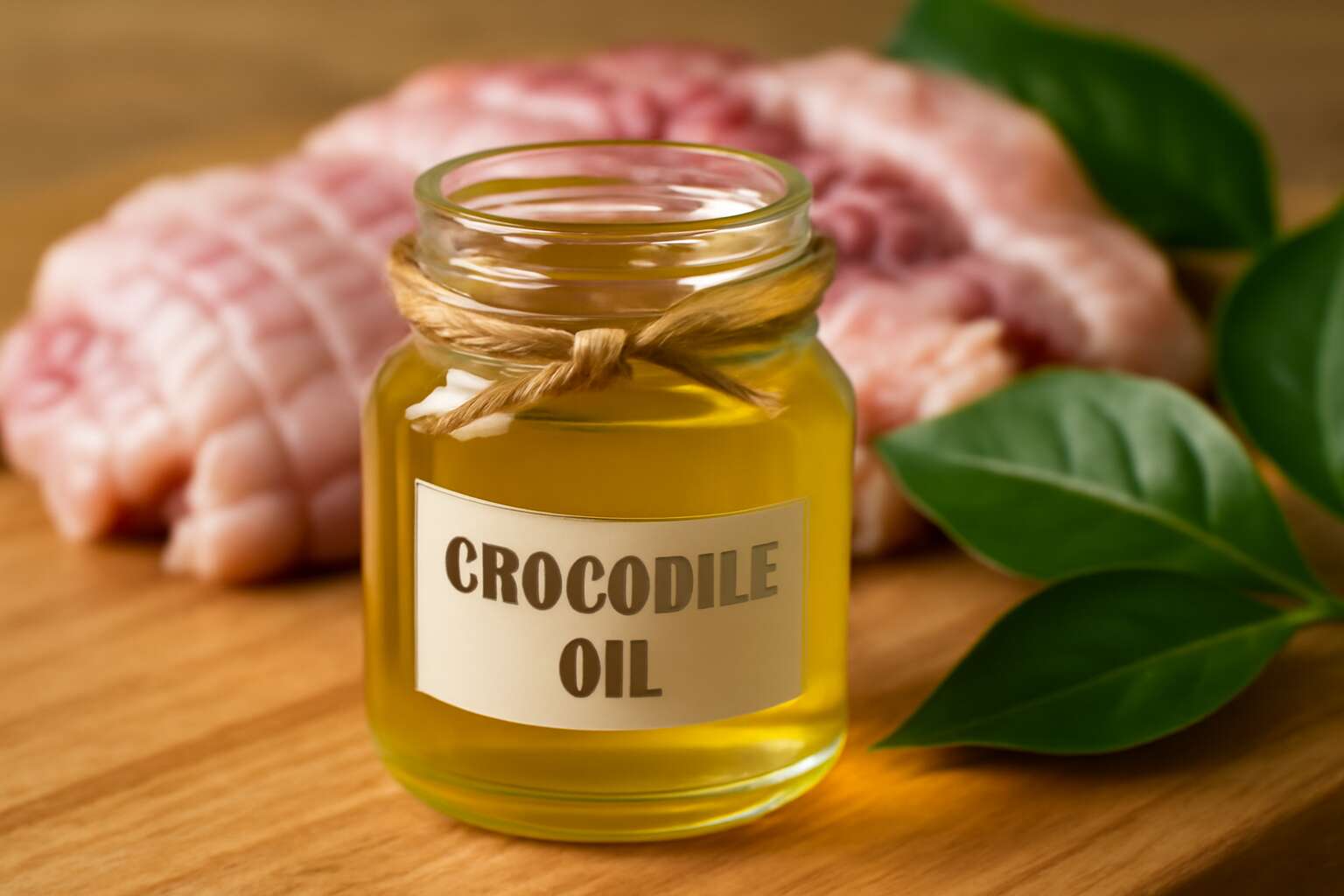Understanding Crocodile Oil and Its Uses
Overview of Crocodile Oil – What is crocodile oil and how is it sourced?
Crocodile oil is not your average skincare ingredient—unless you count the fact that it’s derived from a creature often portrayed as the villain in movies. This exotic oil has been used for centuries in traditional medicine, prized for its purported healing properties and nutrient-rich composition. But before you start slathering it on your skin or ingesting it with reckless abandon, a quick reality check is in order. Understanding crocodile oil and its uses is crucial, especially when considering potential crocodile oil side effects.
So, how is this mysterious oil sourced? The process involves carefully extracting oil from the fat of farmed crocodiles—yes, farmed, not wild. This method ensures sustainability and minimizes ecological impact. The oil itself is packed with omega fatty acids, antioxidants, and other bioactive compounds that make it attractive for skincare and medicinal purposes. However, it’s not all rainbows and crocodile tears; some users have reported adverse reactions, making it vital to understand the possible crocodile oil side effects before diving into its tempting benefits.
Common Uses and Benefits – Popular applications in skincare and traditional medicine
Understanding crocodile oil and its uses reveals a fascinating tapestry of traditional healing intertwined with modern allure. This exotic elixir, celebrated for centuries in various cultures, is often lauded for its remarkable ability to rejuvenate skin, soothe inflammation, and promote healing. Its rich composition of omega fatty acids and antioxidants lends it a mythical quality—almost as if it holds the secrets of ancient warriors and healers.
In skincare, crocodile oil is commonly applied to treat scars, dry skin, and signs of aging, making it a prized ingredient among enthusiasts of natural remedies. Traditional medicine also employs it for conditions like joint pain and skin irritations, owing to its purported anti-inflammatory properties. Yet, despite its enchanting reputation, it’s crucial to be aware of potential crocodile oil side effects, which can sometimes overshadow its benefits. Vigilance and knowledge are key to harnessing this potent oil responsibly.
Popular Forms and Products – Different types of crocodile oil products available
Understanding Crocodile Oil and Its Uses Popular Forms and Products
Crocodile oil isn’t just a mystical potion from ancient tales; it’s a versatile product available in various forms tailored to modern needs. From luxurious creams and serums to pure oils, the market caters to those eager to harness its reputed healing properties. The most common forms include topical creams infused with crocodile oil, oil drops, and even capsules designed for internal use—though the latter remains more controversial.
For skincare enthusiasts, crocodile oil products are often formulated to target specific concerns like scars, dry skin, or aging signs. Meanwhile, traditional medicine practitioners favor pure, unadulterated versions for their anti-inflammatory and healing virtues. However, it’s vital to recognize that with these diverse forms come potential crocodile oil side effects, which can vary based on individual sensitivities and product quality.
Being aware of these side effects ensures responsible use, especially as popularity surges in markets like South Africa. After all, even the most exotic remedies warrant a cautious approach—one that respects the complex tapestry of traditional healing and modern scientific scrutiny.
Potential Side Effects of Crocodile Oil
Allergic Reactions – Signs and symptoms of allergic responses
While crocodile oil glimmers with promises of rejuvenation and healing, a shadow lurks beneath its shimmering surface—potential side effects that should not be overlooked. Allergic reactions, though uncommon, can turn a beautifying ritual into a distressing ordeal. Recognizing the signs early can be the difference between a gentle remedy and a painful experience.
Common allergic responses to crocodile oil side effects include redness, itching, swelling, and rash—like petals of irritation blooming unexpectedly. In more severe cases, individuals may suffer from difficulty breathing or dizziness, signaling an urgent need for medical attention. These symptoms often appear within minutes to hours after application, a gentle reminder that even natural substances are not universally benign.
For those with sensitive skin or allergies to marine or animal-based products, caution is advised. Always perform a patch test before full application, and consult a healthcare professional if any adverse reaction occurs. After all, the allure of crocodile oil must be balanced with awareness—nature’s gifts can sometimes carry unintended consequences, reminding us that safety is the true luxury in any beauty ritual.
Skin Irritation and Sensitivity – Possibility of redness, itchiness, or rash
While crocodile oil is celebrated for its potent healing properties, it’s not without potential pitfalls. Skin irritation and sensitivity stand out as common crocodile oil side effects, especially for those with delicate or compromised skin. Redness, itchiness, and rash can suddenly erupt, turning a promising skincare ritual into a source of discomfort. These reactions often manifest within hours of application, reminding us that even natural remedies demand respect.
In some cases, the irritation can escalate, leading to swelling or a burning sensation that signals the skin’s distress. For individuals with sensitive skin or allergies to marine or animal-based products, the risk heightens. Conducting a patch test before full application is a wise precaution, helping to identify adverse responses early. Remember, the allure of crocodile oil must be balanced with awareness—sometimes, the very nature of this oil can trigger unforeseen side effects that challenge its reputation as a miracle cure.
Impact on Skin Conditions – Effects on eczema, acne, or dermatitis
While crocodile oil is often hailed as a natural remedy for various skin conditions, its impact on eczema, acne, and dermatitis can be unpredictable. For some users, the oil’s rich composition may soothe inflamed skin, offering relief from persistent irritation. However, others might experience a different story altogether. The very ingredients that promote healing can sometimes trigger adverse reactions, especially in sensitive individuals.
In particular, crocodile oil side effects may include increased redness, dryness, or even worsening of existing skin issues. For those with pre-existing conditions like eczema or dermatitis, the oil might act as a double-edged sword—potentially calming or exacerbating symptoms. It’s crucial to observe how your skin responds and consult with a dermatologist if adverse effects occur. Remember, natural doesn’t always mean harmless, and every skin type reacts uniquely to new treatments.
- Unusual itching or burning sensation
- Inflammation or swelling
- Breakouts or worsening acne
Understanding the delicate balance of crocodile oil side effects is essential—what heals for one might harm another. Caution and awareness are key when exploring this potent oil for skin conditions. Sometimes, the very nature of crocodile oil can evoke mysterious reactions that challenge its reputation as a miracle cure, reminding us that nature’s remedies demand respect and careful consideration.
Contamination and Quality Issues – Risks from impure or poorly processed oil
While the allure of crocodile oil as a natural remedy has captivated many in South Africa, the dark underbelly of this potent elixir must not be overlooked. Contamination and poor processing can turn this seemingly miraculous oil into a hazardous substance, risking more harm than good. Impurities—such as residual fats, bacteria, or chemical residues—can lead to unforeseen side effects that compromise skin health.
Unregulated sources often lack rigorous quality control, increasing the likelihood of contamination. These risks are compounded when the oil is improperly stored or processed, allowing for bacterial growth or oxidation. Such factors not only diminish the oil’s efficacy but also pose serious health threats, especially when applied directly to sensitive skin.
To mitigate these dangers, it’s vital to scrutinize the quality of crocodile oil before use. Look for products that are certified and undergo thorough purification processes. Always remember, the true power of crocodile oil lies in its purity—poorly processed oil can introduce unwanted side effects that overshadow its potential benefits. When choosing your product, consider:
- Certification from reputable sources
- Clear labeling of processing methods
- Absence of chemical additives or preservatives
In the realm of natural remedies, purity is paramount. Every drop of crocodile oil carries the promise of healing—when free from contamination, it can truly work wonders. But beware the peril of impure products, for they may trigger unpredictable crocodile oil side effects that challenge even the most optimistic expectations.
Interactions with Medications – Potential interactions with topical or oral medicines
While the allure of crocodile oil as a natural remedy continues to grow in South Africa, it is essential to recognize the potential and perils lurking beneath its surface. One of the most overlooked aspects of this potent elixir is its interaction with medications—both topical and oral—that many rely on daily. These interactions can sometimes turn a promising treatment into a source of unexpected side effects.
For instance, crocodile oil side effects may include heightened skin sensitivity or irritation when used alongside certain skin medications. Some individuals might experience an intensification of redness, itching, or rash—symptoms that can escalate if the oil interacts with drugs designed to soothe or heal skin conditions. Conversely, oral consumption of crocodile oil might interfere with blood-thinning medications, posing risks of bleeding or bruising.
Understanding these risks underscores the importance of consulting healthcare professionals before incorporating crocodile oil into your routine—especially if you are on medication. In certain cases, the oil’s natural compounds could alter the effectiveness of your prescribed treatments, leading to unforeseen complications. Always approach with caution, for beneath its seemingly healing veneer, crocodile oil side effects can weave a complex web of interactions that demand respect and vigilance.
Risks and Precautions When Using Crocodile Oil
Who Should Avoid Crocodile Oil – Populations at higher risk of adverse effects
While crocodile oil has gained popularity for its purported skin-healing properties, it’s wise to approach its use with a dash of caution. The reality is, not everyone benefits equally—and some populations are more vulnerable to crocodile oil side effects than others. For individuals with sensitive skin or a history of allergies, the risk of adverse reactions escalates significantly. An allergic response may manifest as swelling, hives, or difficulty breathing—reactions that demand immediate attention.
Moreover, those with pre-existing skin conditions like eczema or dermatitis might find that crocodile oil exacerbates their symptoms rather than alleviating them. Skin irritation and sensitivity are common concerns, especially if the oil is impure or poorly processed. People with compromised immune systems or those taking certain medications should exercise heightened caution, as interactions with topical or oral medicines could complicate their health profile.
- Individuals prone to allergic reactions
- People with chronic skin conditions
- Those with immune system impairments
In South Africa, where traditional remedies intertwine with modern skincare, understanding who should avoid crocodile oil is crucial to prevent unwanted side effects. The allure of this exotic extract should never overshadow the importance of safety—especially for vulnerable populations at higher risk of adverse effects from crocodile oil side effects.
Patch Testing Guidelines – Importance of testing before full application
When venturing into the realm of traditional remedies like crocodile oil, caution remains the steadfast guardian against unforeseen consequences. The enchantment of this exotic extract can be alluring, but a prudent approach involves rigorous patch testing before embracing its full potential. This preliminary step acts as a safeguard, revealing hidden sensitivities that might otherwise manifest as redness, itching, or swelling—classic crocodile oil side effects that could mar your skin’s harmony.
Applying a small amount on a discreet patch of skin, such as behind the ear or on the inner wrist, provides invaluable insight into how your body responds. If any adverse reaction occurs within 24 hours, it’s wise to pause and consult a healthcare professional. Remember, even the most natural remedies can carry risks—particularly for individuals prone to allergic reactions or with sensitive skin. Ensuring purity and quality in the crocodile oil used further minimizes the likelihood of irritation, making patch testing an essential step in your skincare journey.
Recommended Usage and Dosage – Safe amounts and frequency of use
While crocodile oil is hailed for its remarkable skin-healing properties, it’s vital to approach its use with caution. Understanding the risks and adhering to proper precautions can make all the difference in your skincare journey. Excessive or improper application may increase the likelihood of crocodile oil side effects such as skin irritation, redness, or swelling. To avoid these unwelcome surprises, start with a small patch test and observe how your skin reacts over 24 hours.
When considering the safe amounts and frequency of use, moderation is key. Applying a thin layer once daily or every other day allows your skin to acclimate and reduces the risk of adverse reactions. Overuse can lead to clogged pores or irritation, especially for those with sensitive skin.
It’s also wise to be aware of potential interactions with existing medications or skin treatments. For example, if you’re using other topical products for eczema or acne, consult a healthcare professional before introducing crocodile oil into your routine. Remember, the purity of the crocodile oil used is crucial—contaminated or poorly processed oil can magnify the chances of crocodile oil side effects.
Consulting Healthcare Professionals – When to seek medical advice
While crocodile oil is celebrated for its skin-healing prowess, awareness of potential risks remains essential. Consulting healthcare professionals before incorporating this natural remedy into your routine can prevent unexpected adverse reactions. If you notice persistent redness, swelling, or discomfort after application, it’s wise to seek medical advice promptly, as these could be signs of crocodile oil side effects.
In cases where you experience allergic reactions—such as hives, itching, or difficulty breathing—immediate medical attention is crucial. For those with underlying skin conditions like eczema or dermatitis, professional guidance becomes even more important.
- If symptoms worsen or do not improve with time
- When irritation persists despite discontinuation
- In case of unusual swelling or signs of infection
these are clear indicators to consult a healthcare provider without delay. Remember, the purity and source of crocodile oil significantly influence its safety. When uncertain, erring on the side of caution ensures your skincare journey remains both effective and safe from crocodile oil side effects.
Comparing Crocodile Oil Side Effects to Other Oils
Crocodile Oil vs. Fish Oil – Differences in side effects and benefits
When comparing crocodile oil side effects to those of other popular oils like fish oil, the differences are quite revealing. Fish oil, renowned for its omega-3 fatty acids, is generally well-tolerated but can cause mild gastrointestinal discomfort or fishy aftertaste in some users. Crocodile oil, on the other hand, is praised for its potent skin benefits, yet it carries its own set of considerations. The unique composition of crocodile oil means that, although rare, some individuals may experience skin irritation or allergic reactions. Unlike fish oil, which is often associated with bleeding risks if taken in excess, crocodile oil’s primary concern lies in potential contamination or impurities, especially if sourced poorly.
- Possible allergic reactions
- Skin sensitivity issues
- Contamination risks from unregulated sources
Understanding these differences helps consumers navigate the nuanced landscape of natural oils and make informed choices about crocodile oil side effects versus other oils.”
Crocodile Oil vs. Other Natural Oils – Shea butter, coconut oil, and more
When comparing crocodile oil side effects to other natural oils like shea butter or coconut oil, the distinctions become quite significant. While coconut oil is celebrated for its moisturizing properties, some users report skin sensitivity or breakouts, especially if they have sensitive skin. Shea butter, on the other hand, is generally gentle but can occasionally cause minor allergic reactions in certain individuals. Crocodile oil stands out with its potent skin benefits, yet it is not without its own set of considerations. The potential for crocodile oil side effects, such as skin irritation or allergic responses, necessitates cautious use, particularly for those with sensitive or allergy-prone skin.
Unlike more common oils, crocodile oil might carry contamination risks if sourced from unregulated suppliers. Ensuring the quality and purity of crocodile oil is essential to avoid adverse reactions. Some individuals may experience redness, itching, or rash after application, highlighting the importance of conducting patch tests beforehand. Given these differences, understanding the potential crocodile oil side effects helps consumers make informed decisions, especially when weighing it against other natural options like coconut oil or shea butter. Each oil’s unique composition influences its safety profile and effectiveness, making awareness a crucial part of responsible usage.
Understanding Unique Risks – What makes crocodile oil different
Legal and Ethical Considerations
Regulations and Safety Standards – Legality and safety certifications
Understanding the legal and ethical landscape surrounding crocodile oil is crucial for anyone considering its use. In many regions, including South Africa, the procurement and sale of crocodile oil are regulated to prevent illegal poaching and protect endangered species. Consumers should always seek products that adhere to safety standards and possess valid safety certifications, which serve as assurances of quality and ethical sourcing.
Regulatory bodies often require that crocodile oil meet strict safety standards before reaching the market. This includes testing for contamination, purity, and proper processing methods. For those concerned about crocodile oil side effects, verifying certification can significantly reduce risks associated with impure or poorly processed oils. Ensuring legal compliance not only supports conservation efforts but also safeguards your health. Remember, purchasing from reputable sources that openly display their safety standards can make all the difference in avoiding adverse reactions and ensuring a responsible, ethical choice.
Ethical Sourcing and Sustainability – Ensuring humane and sustainable sourcing
In a world increasingly captivated by natural remedies, crocodile oil has emerged as an intriguing contender—yet, beneath its glossy surface lie potential pitfalls. Ethical sourcing and sustainability are not mere buzzwords but vital considerations, especially given the perilous status of crocodile populations. Ensuring that the oil you acquire is procured responsibly safeguards not only the environment but also your well-being. Unethical harvesting can lead to contamination or poor-quality products, heightening the risk of crocodile oil side effects.
Consumers should prioritize products that adhere to rigorous ethical standards, including humane treatment of animals and sustainable harvesting practices. A transparent supply chain, often verified by third-party certifications, serves as a beacon of trust. After all, indulging in the allure of crocodile oil should not come at the expense of conservation efforts or your health. Remember—purchasing from reputable sources that emphasize ethical sourcing can make all the difference in avoiding adverse reactions and ensuring a responsible, health-conscious choice.
Final Thoughts on Crocodile Oil Side Effects
Balancing Benefits and Risks – Making informed choices
Balancing the alluring benefits of crocodile oil with its potential side effects is crucial for making informed choices. While many tout its remarkable properties for skin rejuvenation and traditional medicine, understanding the possible crocodile oil side effects helps prevent unexpected reactions. This natural remedy, cherished for centuries, can sometimes provoke allergic reactions or skin sensitivities, especially in those with sensitive skin or allergies.
For some, the use of crocodile oil may lead to redness, itchiness, or rash, highlighting the importance of patch testing before widespread application. Additionally, contaminated or poorly processed oil poses risks that outweigh its benefits, emphasizing the need for sourcing from reputable suppliers.
In South Africa, where natural products are increasingly embraced, awareness of potential crocodile oil side effects ensures safety and efficacy. Remember, even natural substances demand respect—balancing their benefits with awareness of possible risks is the key to harnessing their true potential.
Monitoring and Discontinuing Use – Signs to stop using crocodile oil
Monitoring the effects of crocodile oil after initial use is essential. Even natural remedies can cause unexpected reactions, so awareness of crocodile oil side effects is vital for safety. If you notice persistent redness, swelling, or irritation, it’s time to reconsider use. Discontinuing application at the first signs of adverse reactions helps prevent more serious skin issues.
Look out for symptoms such as increased itchiness, rash, or burning sensation, which may indicate sensitivity or allergic response. If these occur, stop using crocodile oil immediately and consult a healthcare professional. Keeping track of how your skin responds ensures you avoid prolonged exposure to potential crocodile oil side effects. Remember, the skin’s reaction is a clear indicator of whether the benefits outweigh the risks.
- If irritation persists or worsens after discontinuation, seek medical advice.
- If signs of allergic reactions like swelling or breathing difficulties appear, emergency care is necessary.
Being vigilant with crocodile oil side effects helps maximize its benefits while safeguarding your health. Always listen to your skin and prioritize professional guidance when needed. Natural products demand respect—understanding when to stop use is key to safe and effective application.
Staying Informed – Keeping updated on new research and safety info
Final thoughts on crocodile oil side effects hinge on one fundamental principle: staying informed is your best safeguard. As with any natural remedy, new research and safety information continually emerge, reshaping our understanding of potential risks. Being vigilant about crocodile oil side effects ensures that you enjoy its benefits without unwelcome surprises.
Keeping up-to-date through reputable sources, such as dermatological studies or regulatory updates, can help you identify early signs of adverse reactions. Remember, even natural products demand respect and careful observation. Skin reactions like persistent redness or irritation are your body’s way of signaling that it’s time to reconsider use.
To navigate this landscape safely, consider the following:
- Regularly review current research on crocodile oil side effects.
- Consult healthcare professionals if adverse symptoms occur.
- Discontinue use at the first sign of negative reactions.
In the intricate dance between benefit and risk, staying informed ensures your skin’s health remains the star of the show. Knowledge, after all, is the most elegant armor when exploring the world of natural oils.




0 Comments